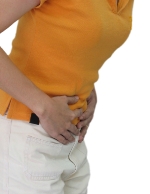What Is IBS?

If you experience symptoms like severe cramping, recurrent diarrhea or constipation that come on without warning you may be suffering from a condition called irritable bowel syndrome. And you’re not alone. It’s estimated that up to 20% of all Americans will experience IBS at some time in their lives. Doctors don’t fully understand IBS just yet but they believe that at least part of the problem lies in how the nerves and muscles in the large intestine exchange information with one another. IBS affects each person differently. Some people experience several symptoms at once while others are bothered mostly by diarrhea or constipation. Some of the most common symptoms of IBS include:
- Cramping in the lower bowel
- Diarrhea
- Constipation
- Flatulence
- Mucous-filled stools
To determine if your symptoms are caused by IBS or something else, your doctor will take an inventory of your symptoms and perform a physical examination. He may test your blood sugar levels and run tests to rule out parasites. If he finds that you do, indeed, have IBS he may prescribe either Lotronex, if you have diarrhea-based symptoms, or Zelnorm, if you have constipation-based symptoms. You may find that minor changes in your diet and lifestyle help, too. Natural approaches to IBS include:
- Keeping a food diary. A food diary will help you identify any foods that act as “triggers” for your symptoms and will help your doctor design a treatment regimen especially for your symptoms.
- Practice deliberate relaxation. IBS is no longer thought of as an “emotional” condition but some patients find that stress aggravates symptoms. If you find this is true for you, too, consider beginning a regular meditation program.
- Lower your fat intake. Some people find that lowering their intake of fatty foods, especially diary, helps, as well.
- Increase your fiber intake. IBS sufferers with constipation-based symptoms sometimes find that increased fiber helps. Increase your daily fiber intake gradually and make sure you drink an appropriate amount of water.
- Consider probiotics. A 2005 study presented at the American College of Gastroenterology annual conference found that probiotic supplements normalized bowel movements and decreased pain, bloating and gas in many women.
IBS is inconvenient, embarrassing and painful but it can be managed with proper medical care and a little bit of good information.
